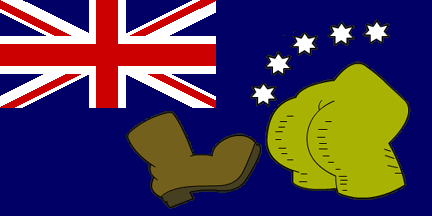8 hours til the polls open.
http://www.theage.com.au/news/opini...1195321945509.html?page=fullpage#contentSwap1
When the luck finally runs out
Robert Manne
November 23, 2007
Illustration: Andrew Dyson
UNLESS scores of astonishingly consistent opinion polls have been systematically misleading, tomorrow the Howard Government will be voted out. How will historians judge it?
Not every judgement will be negative. Even though foreign and personal debt are at record levels, the nation is far wealthier than ever in its history. The Howard Government will be praised for its part in creating the conditions for non-inflationary growth, with low levels of unemployment, but without dismantling the basic pillars of the welfare state. It will also be praised for introducing the GST and using this new tax to finance the states; for introducing effective gun control; and, despite early missteps, for helping East Timor gain its independence.
Compared to the harm it has done to Australia, however, all this will seem relatively trivial. Stimulated by the Hansonite movement, from 1996 the Howard Government has waged a protracted culture war against what it called "political correctness". As part of this war, the Government turned its back on the aspiration that had been embraced by every government from Whitlam to Keating via Fraser — to build a multicultural society in Australia. It did not fight against the Hanson attempt to make "Asians" feel unwelcome in Australia. Following September 11, the rhetoric of Howard Government ministers, which challenged Muslims to prove their loyalty, succeeded in marginalising patriotic citizens. In its desperate eleventh hour, it cast a slur on the Sudanese refugees brought to this country.
The abandonment of multiculturalism was paralleled by the attempt of the Howard Government to deny the moral meaning of the indigenous dispossession. It refused to apologise to the thousands of Aborigines who had been removed, as children, from their mothers and communities. It destroyed the prospect of a symbolic act of reconciliation at the centenary of Federation. The Prime Minister personally encouraged a new denialist school of history, pioneered by Keith Windschuttle.
The abandonment of both the aspiration for multiculturalism and the quest for reconciliation had no direct electoral impact. The Government's callous treatment of asylum seekers, fleeing from the Taliban or Saddam Hussein, did.
At first, using Labor's dangerous mandatory detention legacy, the Howard Government imprisoned these refugees for indefinite periods in appalling desert camps. With the arrival of the Tampa at Christmas Island, in late August 2001, it decided on an even more brutal strategy — to use military force to drive all asylum seekers away. To legitimise its cruelty, the Government let the people believe a lie: that the Iraqi refugees had thrown their own children into the ocean. In the long term, mendacity and a carnal desire for power at almost any cost became the trademarks of the Government. In the short term, "border control" hysteria helped Howard win the November 2001 election.
Tampa was the defining political moment in the history of the Howard Government. Labor was destabilised. Pauline Hanson's One Nation lost its purpose. By now a new kind of political culture had crystallised — populist conservatism. For years, it was exploited by the Howard Government exceedingly well.
John Howard was in Washington on September 11. He made two decisions that dominated the second half of his prime ministership and will determine his reputation.
Howard signed a blank cheque in favour of the United States in its war on terror. As a consequence, Australia followed the US into Iraq, without UN approval and on the basis of false intelligence concerning weapons of mass destruction. Catastrophe has descended — the deaths of hundreds of thousands; the flight of millions; the preparation for religious civil war; the battle-hardening of a new generation of al-Qaeda militants. Iraq was the worst foreign policy blunder of any Australian government.
On September 10, Howard was offered a choice by President Bush: to go with Europe on climate change or to support the US in opposition to binding national carbon emission targets and the Kyoto Treaty. Howard chose to follow the US on global warming, wherever it might go.
Unprecedented international co-operation is the only chance humanity now has for avoiding real disaster. Just as Western governments of the 1930s are now judged over their response to the Nazi threat, so will today's be judged by whether they have risen to the challenge of global warming. Of all Western governments, Bush's America and Howard's Australia — both of which believe that climate change can be combated by voluntary national emissions targets and yet-to-be-discovered technological miracles — will be seen by history as the most blind, reckless and delinquent.
For the past 12 months the Howard Government has been staring at defeat. There are three main reasons. Australia was now in the grip of a ferocious drought, without apparent end. For many Australians this has personalised the seriousness of the climate crisis and the astonishing folly of the Howard Government, for which, until the day before yesterday, global warming denialism — where "the jury was still out" and where "something would turn up" — had been the dominant form of daydream.
In July 2005, the Howard Government took control of the Senate. Getting what it most desired provided the foundation for impending defeat. The Government now introduced to an unsuspecting public, radical "WorkChoices" legislation. Even the name was offensive. As Australia is not America, and as Australians have no wish for it to be, this new law proved a godsend for Labor. Citizens might trust government rhetoric on issues remote from their own lives, such as asylum seekers. They did not need to rely on trust on things personally experienced, such as exploitation in an unequal workplace.
In December 2006, Kevin Rudd took over the leadership of the Labor Party. His combination of ambition, energy and comparative youth; acute political judgement and instinct; natural social conservatism; steady vision, at once generous and modernising; obvious but non-condescending intelligence; and considerable personal charm, made him the most attractive and electable Labor leader since Bob Hawke. With Rudd's arrival, Howard's political luck had finally run out.
Robert Manne is professor of politics at La Trobe University.
____________________
http://www.theage.com.au/news/opini...mains-an-enigma/2007/11/22/1195321945520.html
As one leader shows he's rattled, another remains an enigma
Michelle Grattan
November 23, 2007
THAT the Coalition apparently stands on the brink of defeat at tomorrow's election is an extraordinary indictment of John Howard.
This Prime Minister has been the overwhelming driving force in his Government and, if the Coalition is swept away, as the polls are suggesting, he will have to shoulder most of the blame personally.
He has made bad decisions this term, ranging from WorkChoices to his refusal to retire. After many years of warning against hubris he has succumbed to it. And he has run a poor campaign.
The seeds of a loss — if the polls carry through to election day — were sown in the glory of 2004's great victory. Be careful of what you wish for, the old saying goes. Howard wished for untrammelled power, a Senate that would not obstruct. When he unexpectedly got it, he promised "we're not going to allow this to go to our head" — but it did. The Government became more arrogant. The PM stepped up the culture wars, the history wars, even the Australian contribution to the Iraq war.
Most dangerously for itself, the Government intensified the industrial relations war. It was not surprising — and perfectly reasonable — that it would use its Senate majority to prosecute more workplace reform. It was, however, a major misjudgement to bring in measures that would be seen as excessively harsh, so much so that the Government itself belatedly had to put in a "fairness" test.
Industrial relations was the lever that Labor and the cashed-up union movement, fighting for its life, used to weaken the Coalition's connection to the electorate. The Coalition became a victim of its own policy greed.
The Government's weakness has been what started as its greatest strength. Howard lost his sense of proportion, about policy and what he personally was able to do. In earlier days he knew better how much he could get away with; he also had larger political capital for a few gambles. More recently he has been badly advised, and hasn't taken what good advice presumably also came to him.
Not only did he personally hang on too long; he delayed calling the election when common sense screamed that he should have gone weeks earlier. If there was an interest rate rise looming, although not certain, why would you risk waiting?
In the campaign, the Coalition made more, and more damaging, mistakes than Labor. The Opposition had Peter Garrett's big mouth; the Government had the leak of Malcolm Turnbull's unheeded advice to sign Kyoto, and Tony Abbott's multiple gaffes. Anyone would have thought Howard, after the criticism of his excessive spending in the 2004 "launch", would have avoided a repeat. But he spent even more this launch, received a worse beating, and left himself wide open to Rudd cleverly under-spending him. Local Liberals' attempted fit-up of Labor with a fake leaflet in Lindsay, which said Labor wanted the Bali bombers forgiven, was the cap on this blighted campaign.
In the final desperate days, Howard is repeating the Paul Keating pitch of 1996 — a change of government would mean a change of direction for the country. Howard argues that there is a difference between 2007 and 1996 — that people now are not dissatisfied with the country's direction.
Howard's right that there is not the anger of 1996, and his personal ratings remain high. But he underestimates the extent to which people want to move on from his era. Governments can have use-by dates even when they are managing the economy quite well. The power of the new is a factor in politics as much as in other aspects of modern life.
Today's Age/Nielsen poll points to a strong win for a Rudd government but Howard yesterday declared he could still get home. Earlier he was more inclined to seek underdog status, but now he seeks to claim the life force of a winner.
In elections, of course, strange things happen at the end and poll results can err. The Nielsen poll suggests it is unlikely Howard could hang on — Galaxy is closer — but in 1999 the election day story, based on polling, said Jeff Kennett was heading to a third landslide. In 1998 Howard got a majority of seats but a minority of votes. It would be fascinating if Howard pulled this election out of the fire: given what seems the strong national mood for change, the Government could be faced with a resentful, sullen electorate.
Rudd has surprised almost everyone with how effective he has been as Leader of the Opposition. Politics, however, is one endless test — leaders can't rest on their laurels for long. If Rudd does win, he will have huge authority in his party and he has indicated he will use that to break with Labor tradition to personally choose his front bench. It will be his first challenge.
Beyond that, Rudd would use his authority to impose his policy line. As time goes on this would test his political management skills. The party has given him free rein for the sake of trying to get to power; once the intoxication of the honeymoon has worn off, competing interests would reassert themselves.
We have seen, in the postwar period, two changes to a Labor government. The Whitlam one arrived with every i dotted and t crossed on its policies — and did not translate into office very well although it left some enduring legacies. The Hawke government, in contrast, was more flexible and performed impressively.
We knew a great deal more about Whitlam and Hawke before they were elected than we do about Rudd. On the other side of the fence, Howard was a known quantity when he won. Despite all the talk, it is still hard to draw, in one's mind's eye, anything but a crayon sketch of "Kevin Rudd PM". That's one reason why, if Rudd wins tomorrow, what follows will be something of an adventure.
Michelle Grattan is political editor.


























